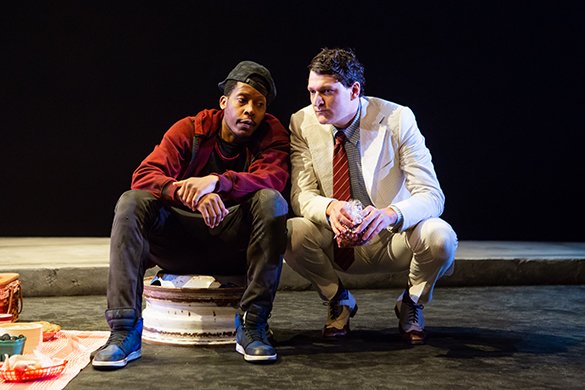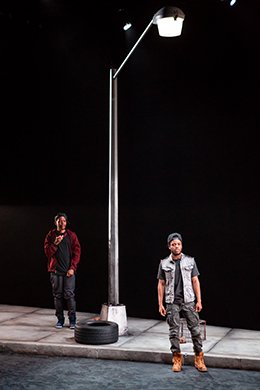
Kitch (Namir Smallwood) and Mister (Gabriel Ebert) wonder what’s next in Antoinette Nwandu’s Pass Over (photo by Jeremy Daniel)
Claire Tow Theater
LCT3/Lincoln Center Theater
150 West 65th St.
Through July 22, $30
www.lct.org
Antoinette Nwandu takes a hard look at who we are as a nation through the eyes of a pair of young, disenfranchised black men in the searing Pass Over, continuing at Lincoln Center’s Claire Tow Theater through July 22. As you enter the small, intimate venue, the main characters are already onstage, one sleeping under a lamp post, the other walking back and forth across a long, angled street curb, occasionally stopping and staring out suspiciously, as if expecting trouble, from racial profiling to blatant discrimination and bigotry. The former is Moses (Jon Michael Hill), a stern, angry man with “plans to rise up to my full potential,” while the latter is Kitch (Namir Smallwood), a naive, less ambitious guy. They call each other by the n-word so often that it is meant to make the mostly white audience feel uncomfortable; in fact, to further that feeling, one reason the two-act, eighty-five-minute show has no intermission is that “if Moses and Kitch cannot leave, neither can you,” Nwandu writes in the script. The two men often talk of getting out, their conversations punctuated by abrupt lighting shifts as they raise their hands in the air, as if suddenly facing the police, or the “po-pos.”
Their space is soon invaded by Mister (Gabriel Ebert), a privileged version of Little Red Riding Hood; Mister is a tall Caucasian man dressed in an all-white suit, with white shoes and a white hat and carrying a picnic basket. He says he got lost on the way to his mother’s house and offers to share his food with them in exchange for their allowing him to sit down and rest his “weak arches.” While Kitch is aching to dig in to the grub, Moses wants no part of Mister, suspicious of his motives and why he’s there. Although they speak a very different language — Mister talks formally and says things like “gosh golly gee” and “salutations,” in blunt contrast to the street poetry of Kitch and Moses — they quickly begin discussing police treatment of blacks, hunger, and the n-word. “Gosh / you really like that word. . . . I mean / every sentence / my n-word this / my n-word that,” Mister says. “Maaaaaan / quit actin’ like / yo ass ain’t sed dat shit,” Kitch argues, but Mister insists he has never used the term. “If they don’t / bess believe / dey want to,” Moses says about white men who claim they don’t say it. A few minutes later, Mister departs, and a uniformed white cop, Ossifer (Ebert), shows up, immediately threatening Moses and Kitch. “Talk shit / like they got power / ain’t got no power / cept dat gun / dat fuckin badge,” Moses says after the policeman has left. They then go to sleep, hoping that the next day will be better. It’s not.

Trouble awaits Kitch (Namir Smallwood) and Moses (Jon Michael Hill) in Pass Over (photo by Jeremy Daniel)
Waiting for Godot meets the biblical story of the Exodus from Egypt in Pass Over, a dark, twenty-first-century fable of the state of race relations in America today — and how much things haven’t changed since before the Civil War. In the script, Nwandu refers to Moses as a slave driver and God’s chosen leader, Kitch as a slave and one of God’s chosen, Mister as a plantation owner and pharaoh’s son, and Ossifer as a patroller and a soldier in pharaoh’s army; she also notes that the play takes place in the present as well as 1855 and the thirteenth century BCE, on a ghetto street, on a plantation, and in Egypt, expanding the timelessness of the central narrative. However, the characters, Wilson Chin’s set, and Sarafina Bush’s costumes never switch eras, equating the perpetual nature of racism and slavery through the ages. Tony nominee Hill (Superior Donuts, The Unmentionables) and Smallwood (Pipeline, Buzzer) sizzle as updated versions of Beckett’s Vladimir and Estragon, waiting and hoping for a promised land that appears to be far beyond their reach, while Tony and Obie winner Ebert (Matilda the Musical, 4000 Miles) attacks his two roles with relish. The play, which premiered last year at Steppenwolf and was filmed by Spike Lee, is boldly honest, both funny and frightening. When Mister tells Moses and Kitch, “If i were in your shoes / gosh / i’d be terrified,” he’s speaking for everyone in the audience. Taymor (Esai’s Table, Nwandu’s Flat Sam), whose aunt is Emmy and two-time Tony winner Julie Taymor, directs with a sure hand, letting the subject matter take shape before it all shatters. Pass Over ushers in a fresh, vibrant voice in Nwandu, who includes a shock ending to make sure we get her devastating message.